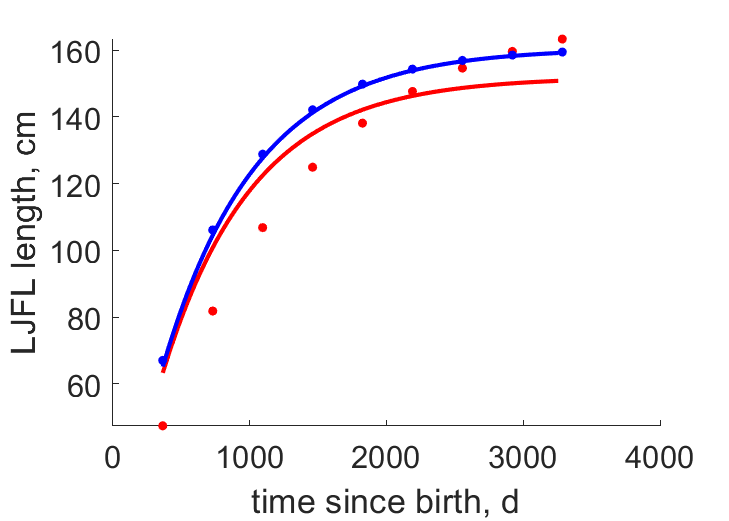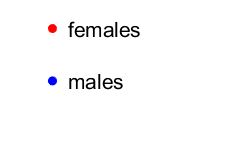Predictions & Data for this entry
| Model: abj | climate: MA, MB | migrate: Mo | phylum: |
| COMPLETE = 2.5 | ecozone: MA | food: bjPz, jiCvf, jiCic | class: |
| MRE = 0.058 | habitat: 0iMpe | gender: D | order: |
| SMSE = 0.006 | embryo: Mp | reprod: O | family: |
Zero-variate data
| Data | Observed | Predicted | (RE) | Unit | Description | Reference |
|---|---|---|---|---|---|---|
| ab | 6 | 6.943 | (0.1572) | d | age at birth | guess |
| am | 7300 | 7836 | (0.07347) | d | life span | WinkMour2020 |
| Lp | 164 | 149.5 | (0.0887) | cm | total length at puberty | fishbase |
| Li | 300 | 282.9 | (0.05689) | cm | ultimate total length | fishbase |
| Wwb | 0.0007 | 0.0005843 | (0.1653) | g | wet weight at birth | ArocBarr2009 |
| Wwp | 4.026e+04 | 4.003e+04 | (0.005848) | g | wet weight at puberty | fishbase |
| Wwi | 2.682e+05 | 2.716e+05 | (0.01259) | g | ultimate wet weight | fishbase |
| Ri | 2403 | 2137 | (0.1105) | #/d | reprod rate at 179 cm | ArocBarr2009 |
Uni- and bivariate data
| Data | Figure | Independent variable | Dependent variable | (RE) | Reference |
|---|---|---|---|---|---|
| tL_fm |   | time since birth | LJFL length | (0.04469) | WinkMour2020 |
Pseudo-data at Tref = 20°C
| Data | Generalised animal | Kajikia albida | Unit | Description |
|---|---|---|---|---|
| v | 0.02 | 0.01518 | cm/d | energy conductance |
| p_M | 18 | 50.05 | J/d.cm^3 | vol-spec som maint |
| k_J | 0.002 | 0.002 | 1/d | maturity maint rate coefficient |
| k | 0.3 | 0.2089 | - | maintenance ratio |
| kap | 0.8 | 0.9913 | - | allocation fraction to soma |
| kap_G | 0.8 | 0.8003 | - | growth efficiency |
| kap_R | 0.95 | 0.95 | - | reproduction efficiency |
Discussion
- males are assumed to differ from females by {p_Am} only
Facts
- length-weight: Ww in g = 0.00447*(TL in cm)^3.14 (Ref: fishbase)
- Atlantic Ocean: roughly from 45N to 45S in the southwestern Atlantic and 35S in the southeastern Atlantic. Records from the Mediterranean Sea, and from Bretagne, France seem to correspond to a few straying individuals
Bibliography